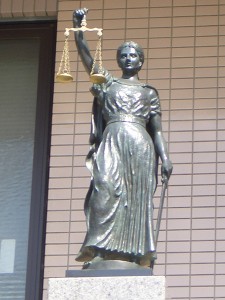 “The Trial of all Crimes, except in Cases of Impeachment, shall be by Jury; and such Trial shall be held in the State where the said Crimes shall have been committed…” (US Constitution, Article III, Section 2, Paragraph 3).
“The Trial of all Crimes, except in Cases of Impeachment, shall be by Jury; and such Trial shall be held in the State where the said Crimes shall have been committed…” (US Constitution, Article III, Section 2, Paragraph 3).
Last week, I was summoned for jury duty. I absolutely loved my Consitutional Law and Administrative Law classes at the University of Utah, so I was kind of excited and I instantly had flashes of the movie Twelve Angry Men flash through my mind. Despite a hectic schedule and several pressing projects at work, I proudly fulfilled my civic duty and travelled downtown to the Salt Lake City Courthouse. Strangely, I have lived in Utah for the last 17 years, but this was the first time I had been selected to possibly serve on a jury for a state trial. I had been summoned a few years ago for jury duty in Federal Court, but I was eliminated for cause because I went to high school with the prosecuting attorney (John Huber). The State Courts draw potential jurors randomly from voting and drivers license records, which is why I was surprised I had never been chosen until now (my wife has never been selected). I also learned that the Salt Lake City Court only handles misdemeanor cases, so most of the proceedings last only one day, and the jury only consists of four people.
I was juror number 18 out of 22, so I knew my chances were small that I would ultimately end up serving (I also later found out that they start at the top of the list and work their way down, which made my chances even slimmer). After filling out the paperwork and getting our whopping salary of $18.50 for our day of service (plus the ever-important parking validation), we had to wait around for more than an hour while the court docket was reviewed and the judge decided which trial was ready to proceed (the first two trials on the docket had motions filed to postpone, and then it took some time to get the involved parties ready for the third trial). Once everyone was in place, we were escorted into the courtroom and introduced to the judge, the lawyers, the defendant, and the witnesses. The judge explained the nature of the case before us, which involved domestic assault, and then we proceeded with voir dire, the process wherein the judge asks questions of the jury pool to determine if there might be any reason(s) that would call into question our ability to be impartial. This took a while because about half the panel raised their hands when asked about any past experience with violence in their families. The judge and lawyers retired to the judge’s chambers and each person that raised their hand was taken one by one into his chambers to hear what their experience consisted of. When all the questioning was finished, the list of jurors was reviewed by the lawyers, and they each took turns with their peremptory strikes. Both sides are allowed to eliminate three jurors from the list without need for any cause or reason. Finally, the judge announced the names of the four selected jurors (numbers 3, 5, 8, and 11) and the rest of us were dismissed.
Was I disappointed? A little bit, but I got over it pretty quickly as I headed home for lunch. I would gladly have taken my turn and tried my best to be fair and attentive for the sake of both sides, but maybe next time.
© Copyright 2012 Jeff, All rights Reserved. Written For: Jeffrey Olsen

